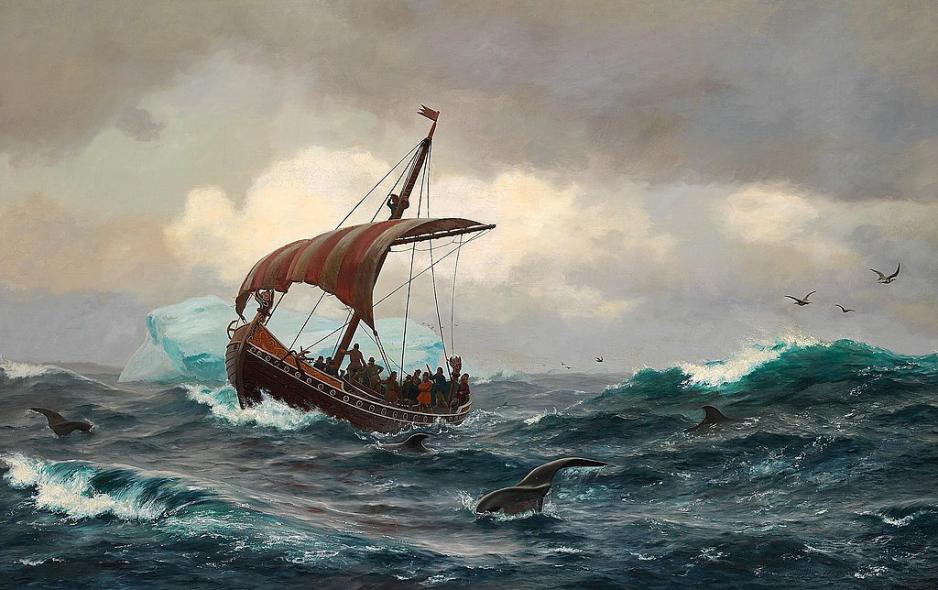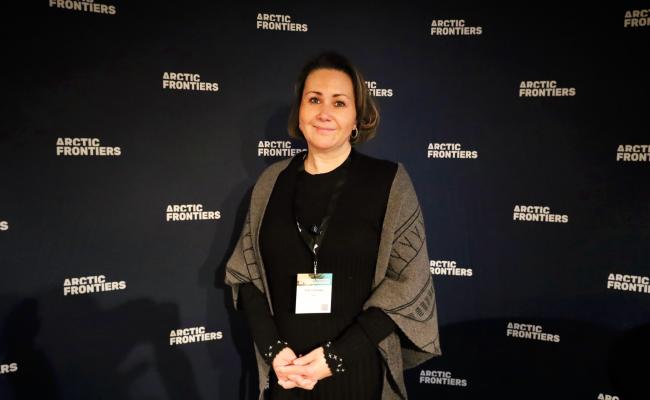Debate: The Art of Trump’s Greenland Deal: A New Chapter of an Ancient Saga

Like the Viking Age Norse before the Early Modern Danes, America has long had its eye on its northeastern neighbor, illustrated by the Danish painter E. C. Rasmussen's "Summer night under the Greenland coast circa 1000". (Carl Rasmussen, Public domain, via Wikimedia Commons)
Op-ed: Trump’s attitude towards Greenland offers disturbing echoes of the past. Like the Viking Age Norse before the Early Modern Danes, America has long had its eye on its northeastern neighbor, writes Christopher Fee, Professor of History.
This is an opinion piece written by an external contributor. The views expressed are the authors' own.
Spurred by Donald Trump’s stated desire to acquire the Arctic island, Greenland has just called for a general election on March 11 to try to clarify the popular will of the Greenlanders.
President Trump’s recent communication with the Danish Prime Minister sent shockwaves through one of America’s most stalwart allies, and Marco Rubio then said that this is “not a joke.”
Most disturbing, Trump has refused to take off the table the use of force in annexing Greenland, saber-rattling that could rip apart NATO. Sadly, this is not the first time he has raised this idea, and it may be more than bellicose bluster.
Moreover, Trump’s attitude towards Greenland offers disturbing echoes of the past. Like the Viking Age Norse before the Early Modern Danes, America has long had its eye on its northeastern neighbor.
As CNN reported during its coverage of Trump’s 2019 comments on “buying” Greenland, he was not the first U.S. President accused of suggesting a land-grab in the Arctic:
Many Greenlanders see the U.S. as even less a hospitable colonial partner than is Denmark.
The blatant imperialism of this sort of “sovereignty purchase,” however, is in direct conflict with the autonomy of 21st Century Greenlanders. Trump’s real-estate mogul impulses threaten, in CNN’s phrase, “to run headlong into international law.”
The Greenlandic view on this has long been unequivocal. For good reason, many Greenlanders see the U.S. as even less a hospitable colonial partner than is Denmark.
This is especially true given the experience of the U.S. Virgin Islands, which, as the High North News reported, “Denmark sold to the U.S. in 1916 and whose inhabitants, many of which live below the poverty line, still have no voting rights in the U.S.”
In any case, as the BBC reported, “Danish premiere Frederiksen said earlier this month that ‘Greenland belongs to the Greenlanders,’ and only the local population could determine its future.”
As they do so in the coming election, Greenlanders should remember not to expect any real sense of partnership from Donald Trump.
Also read (the text continues below):
As noble as the joint statement of Greenlandic MP Aaja Chemnitz and US Senator Lisa Murkowski calling for such a partnership is, Donald Trump has proven himself to be a very poor ally indeed.
Moreover, he can't be counted on to keep his word nor to tell the truth, and whatever Murkowski’s good intentions may be, she can’t control Trump. On the contrary, Republican Senators have fallen into line to support Trump’s agenda, however extreme.
Beneath Trump’s rhetoric of national defense lies a none-too-subtle subtext of profitable extraction of natural resources, “such as rare earth minerals and uranium,” as reported by NPR.
As the Arctic warms and the ice recedes in Greenland, these resources will become ever more accessible. This is nothing new: The Norse colonized and exploited Greenland for its riches long before Columbus.
In the Viking Age, these included walrus ivory, bearskins, whale blubber, and sealskin for ropes. Today the resources have changed, but Trump is exhibiting the same greedy impulse to claim them, as well as the same blithe contempt for the autonomy of those who already live there.
Constant sources of tension between the citizens of Greenland and the Danish government.
Also read (the text continues below):
Greenland took on special significance during the Cold War because of its strategic significance to NATO. Danish-Greenlandic relations were especially strained by a 1968 American B-52 accident involving nuclear warheads.
Meanwhile, Pituffik Space Base (formerly known as Thule Airbase) the “DoD’s northernmost installation,” as well as a mass of tunnels filled with nuclear waste known as “Camp Century,” continue to be constant sources of tension between the citizens of Greenland (who have autonomous Home Rule concerning domestic policy) and the Danish government still responsible for Greenland’s Foreign Policy and Defense.
These tensions are now at the breaking point because of Trump’s acquisitive attitude. Once again, imperialist prerogatives imposed from afar sharply diverge from local interests, and this tension seems poised to put into motion cataclysmic changes in the North Atlantic.
This is a new chapter of an ancient saga: Norse attitudes towards the peoples and resources of North America eerily presaged those of Europeans after 1492.
Moreover, the Kingdom of Denmark based its claim on Greenland in large part on the theory of authority over the vanished Norse Colonies. Greenland now represents Denmark’s last gasp of empire.
They should determine their own future.
However, whatever mistakes the Danes have made in their relationship with Greenland—and there have been many—the autonomy of the Greenlanders should be respected by all.
They should determine their own future, they should not be cajoled or coerced, and Trump should be called to task by all Americans for what Foreign Policy recently dubbed his “public bullying” of Greenland.
Americans pride ourselves on respect for liberty and justice, although all too often we have fallen short of these ideals in our dealings with Indigenous and other vulnerable peoples. This is an opportunity for Americans to do the right thing.
We must not let the expedient excuses of national security and desirable resources cause us to react with fear and greed, yielding to tyranny and impunity.
It’s time to rectify the long list of wrongs already enacted against the people of Greenland, not to add to it another example of inexcusable exploitation.






